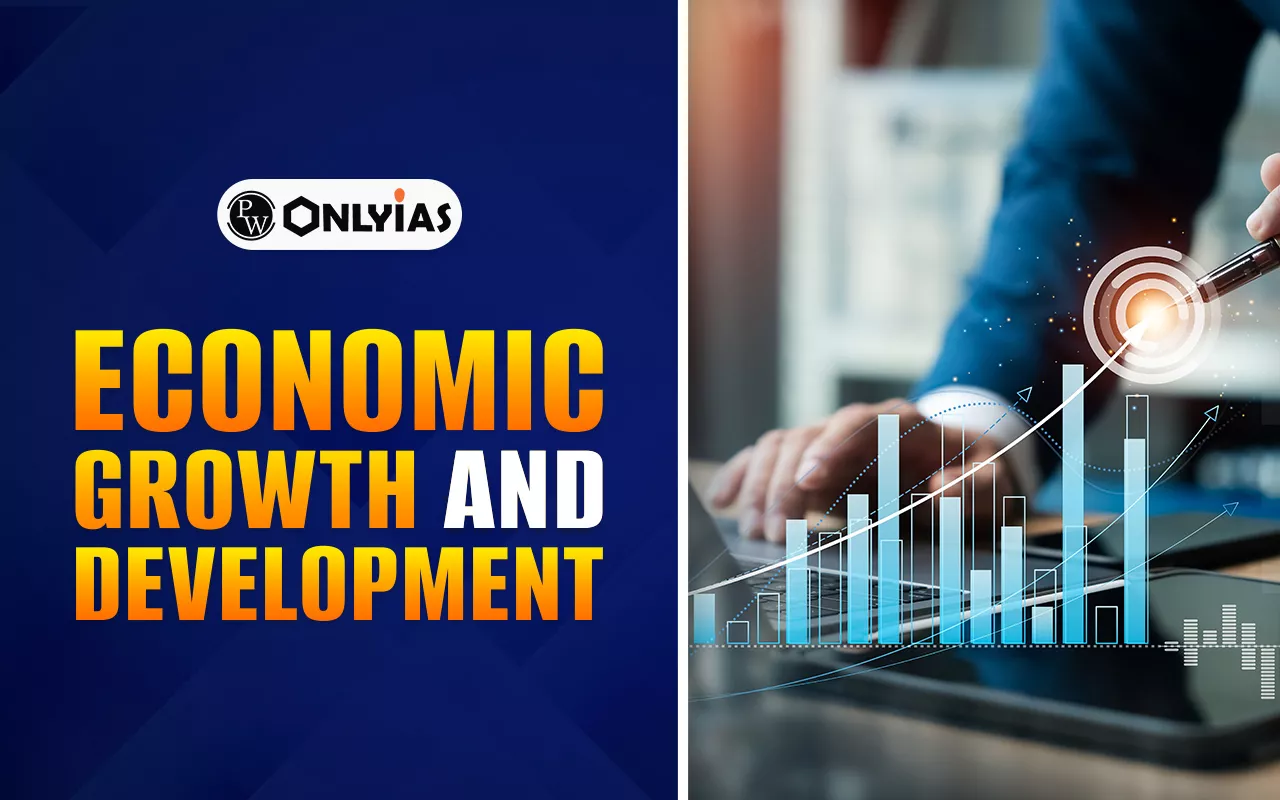Economic Growth and Development differ in scope—growth measures the quantitative rise in a nation’s GDP, while development focuses on qualitative improvements in living standards, education, and health. Understanding their key differences and importance helps promote inclusive, sustainable progress that benefits society as a whole.

Economic Growth and Development: Economic growth is characterized by an increase in the amount of goods and services produced by a country, and is usually measured by the increase in Gross Domestic Product (GDP). It is indicative of a quantitative expansion, implying an increase in national income and output over time. Economic development, on the other hand, is a broader concept that encompasses some degree of quality of life improvements, indicators pertaining to the improvement of living standards, health, education, equitable distribution of national income, and social welfare improvement and sustainability, together with economic development.
Economic growth is simply about economic expansion, while economic development ensures that economic expansion works to the benefit of the population in an inclusive and sustainable way, leading to broad improvements in social welfare, a reduction in poverty, and inequalities.
Economic growth refers to a quantitative increase in a country’s production of goods and services, commonly measured by the Gross Domestic Product (GDP). It reflects how much more an economy produces compared to previous years and shows rising income levels and business activities.
Economic development, on the other hand, is a broader and qualitative concept. It involves improving people’s living standards, health, education, and income distribution. Economic growth contributes to economic development, but development ensures the benefits are more inclusive and sustainable, covering social, cultural, and institutional progress.
We need to differentiate economic growth and economic development to understand the way nations develop. Economic growth dwells primarily in the growth of the national income and output. Conversely, economic development is an aspect that involves raising the standard of living, i.e. improving education, health and low rates of poverty.
Economic growth refers to the quantity of what the economy produces, whereas economic development refers to the quality of the benefits that the society gains. As an example, a nation might be experiencing good economic growth and yet inequality and poor social services are evident, i.e. development is not at full scale.
Economic growth is needed to create resources, but economic development goes further to ensure that the resources create significant change in the lives of people. Development could result in inequality, environmental degradation and social instabilities.
Economic growth can result in increased employment and incomes, whereas economic development aims to improve social welfare, alleviate poverty and equitably distribute resources. The two terms are mutually supportive, as growth is a motivating factor, whereas development is an objective that influences policies towards holistic advancement.
Economic growth refers to the quantitative increase in a country’s output of goods and services, usually measured by GDP. Economic development is a broader concept that includes qualitative improvements in living standards, health, education, and equitable income distribution, ensuring the overall well-being of society beyond just income increases. Here is the tabulated differences provided.
| Difference Between Economic Growth and Economic Development | ||
| Aspect | Economic Growth | Economic Development |
| Definition | Increase in production of goods and services | Qualitative improvements in living standards and welfare |
| Measurement | Gross Domestic Product (GDP) | Human Development Index, literacy, health indicators |
| Focus | Quantity/size of the economy | Quality of life and equitable distribution |
| Time Frame | Short to medium term | Long term and sustainable |
| Impact | Higher income, output | Reduced poverty, better education, healthcare |
| Employment | Job creation | Better job quality and income equality |
| Sustainability | May ignore environmental costs | Emphasizes sustainable resource use |
A country experiencing economic growth sees an increase in national income, industrial output, and service activities. This growth provides governments with funds for infrastructure, health, and education.
Economic development ensures that this growth transforms into social progress by improving literacy rates, reducing infant mortality, and providing basic services. It aims at reducing inequalities and making growth inclusive.
Check Out UPSC CSE Books
Visit PW Store
It is not difficult to measure economic growth, but economic development is considerably more complex since it relies on strong institutions, good governance, investment in human capital, and policies that promote environmental sustainability. Several developing countries have struggled to translate growth into development, often citing issues like corruption, weak infrastructure, and unevenly distributed resources, among other complicated and interrelated issues. Balancing economic growth with social welfare will continue to be an important policy issue in many countries.
Ready to boost your UPSC 2026 preparation? Join PW’s UPSC online courses today!
Economic growth focuses on the increase in a nation’s output or income, whereas economic development is about improving the quality of life, including health, education, and equitable income distribution.
Economic growth is typically measured by GDP or GNP, reflecting production size. Economic development considers broader indicators like the Human Development Index (HDI), literacy, and poverty rates.
Yes, a country may show high economic growth but still lack development if the benefits are unevenly distributed or social welfare indicators remain poor.
Economic development ensures that growth results in improved living standards, social justice, and sustainable resource use, making growth meaningful for the entire population.
<div class="new-fform">
</div>